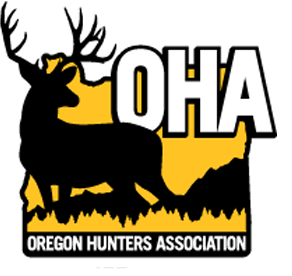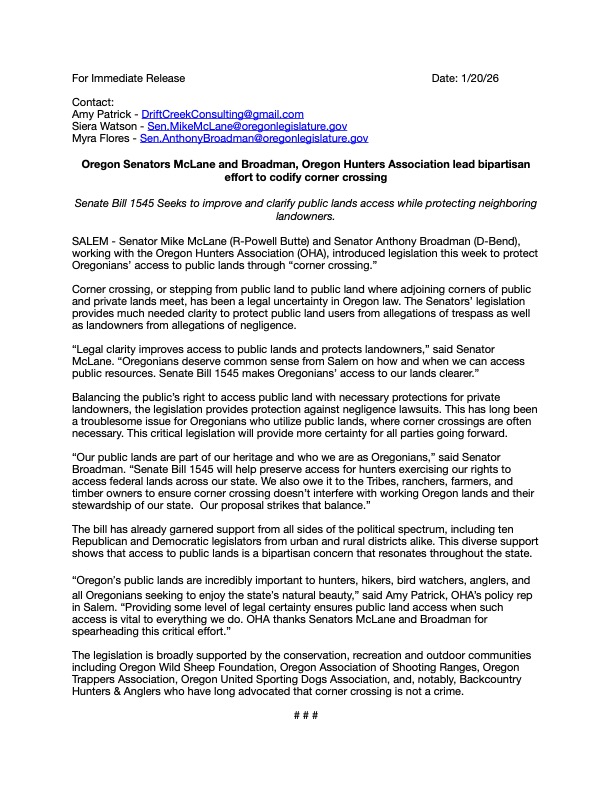IP 28 News – Click HERE
OHA leads the way on Corner Crossing Bill
OHA is announcing the official introduction of Senate Bill 1545 to clarify your ability to access public lands through “corner crossing.”
OHA has been working diligently on this concept on behalf of our membership and the hunting community, as a whole. This bill is a game-changer for solving the legal ambiguity related to corner crossing that has kept Oregonians from accessing our own public land for far too long.
WHAT THIS DOES FOR US:
Clarifies Access: This bill finally clarifies the legal “gray area” of corner crossing, providing clear access to land that has historically been difficult to access, especially in the ‘checkerboard’ of public-private ownership.
Provides Protections for All Parties: The bill provides protection for the public from allegations of trespassing when corner crossing from public land to public land. It also provides necessary protection for neighboring private property owners.
Bipartisan Support: The bill is spearheaded by the bi-partisan team of Senator Mike McLane (R-Powell Butte) and Senator Anthony Broadman (D-Bend); they are joined by legislators from across rural and urban demographics who support SB 1545 and the ability for Oregonians to access our public lands.
WE’LL NEED YOUR HELP:
The legislative session begins on February 2 and this bill will move quickly so we’ll need all of our members to stand with us and support this bill.
We will be reaching out to you soon with a Call to Action for our membership to provide testimony and communication with your legislators.
OHA’s work leads to CWD testing at OSU
OHA’s diligent work in the Capitol has to produced tangible results for Oregon’s hunting community. This fall, the Oregon Veterinary Diagnostic Laboratory (OVDL) at Oregon State University began testing deer samples collected in Oregon for chronic wasting disease (CWD) with elk samples to be online soon.
In 2023, OHA worked with legislators to author the original funding bill to establish in-state testing at the OVDL. It took two sessions of work to finally pass the bill in 2024 and allocate $2.7 million in state funds toward monitoring and testing for CWD. $1.9 million of those funds went to the OVDL for personnel, training, and equipment to set up their laboratory for CWD testing; the remaining funds were directed to ODFW for sample collection and monitoring efforts.
With in-state testing at the OVDL, hunters no longer have to wait 7-8 weeks for results, as was previously the case when samples were sent to Colorado State University. Now, the OVDL has the capacity to turn around results within a week of receiving the samples. The speed of the results not only benefits the hunting community but also allows for a much faster response time from ODFW, should a positive sample be found.
OHA will continue to advocate for funds to maintain and expand the OVDL’s capacity to assist the hunting community and to ensure our wildlife populations remain healthy.
New appointments approved for the Fish & Game Commission
With the confirmed appointments to The Fish & Game Commission in November, the Commission is back to full capacity after nearly a year of operating with a vacant position.
Dave Moldal and Hugh Morrison were appointed by the Governor and confirmed by the Senate to serve as the Commissioners from the Northwest Region. They replaced Commissioner Kahlil, who stepped down in January due to moving out of state, and Commissioner King, who was not reappointed for a second term.
The sportsmen’s community participated in the appointment process, working with the Governor’s office to provide input on potential candidates. During the process, the new Commissioners met with numerous stakeholder groups and sportsmen’s organizations with none of the groups voicing concern at their appointment.
Both Mr. Moldal and Mr. Morrison have backgrounds in conservation work, wildlife management, working with private landowners, and both have experience in hunting, fishing, and the outdoors. OHA looks forward to working with them in their new capacity as Fish & Game Commissioners.
What is really happening with Oregon gun laws?
On September 26, Senate Bill 243 became law. This bill began as the Firearms Omnibus bill which initially included a ban on firearms purchase and possession for anyone under the age of 21, a mandatory 72-hour waiting period, a broad restriction on concealed carry in public buildings and adjoining land, and a ban on rapid fire activators. We were successful in removing both the age restriction and the waiting period components from the final version of the bill, as well as narrowing the parameters for the public buildings restrictions.
What the final version of SB 243 put into law:
- The rapid fire activator portion of the bill defines those items as binary triggers, bump stocks, burst triggers, forced reset triggers, trigger cranks, switch, auto seer, hellfire trigger, or similar devices. It makes the possession of these items a Class A misdemeanor while the transport, manufacturing or transfer of these items is a Class B Felony.
- The public buildings restrictions portion of the bill allows a local government to restrict the ability to concealed carry in buildings they own or control and that are used for official meetings. These restrictions must be posted at entry points and listed on any official website.
One additional section of SB 243 has caused some confusion as it relates to Measure 114. The bill includes language with an implementation date of March 15, 2026 for both the permit-to-purchase portion and the ‘large-capacity’ magazine portion of the ballot measure. However, this language cannot supersede the fact that Measure 114 is on hold as the on-going litigation proceeds through the court system.
Measure 114 status:
- There is a permanent injunction against the implementation of Measure 114 and that remains as the lawsuit goes through the courts.
- The case will be heard by the Oregon Supreme Court with oral arguments scheduled to begin on November 6, 2025.
- The court could take anywhere from 3 months to a year to issue their ruling.
- Should the court rule to uphold Measure 114, the implementation would still be delayed by the processes needed complete that ruling.
Key Takeaways:
- Measure 114 remains on hold, regardless of the language in SB 243.
- OHA Chapters should continue with 2026 fundraisers, as planned.
- Should the court ruling uphold Measure 114 and be issued during banquet season, we will work with designated FFLs to hold firearms pending any necessary implementation or permit-to-purchase process.
To support the lawsuit against Measure 114, donate here: https://www.givesendgo.com/StateCourt_StopMeasure114/.
Sign up for OHA updates and alerts at:

